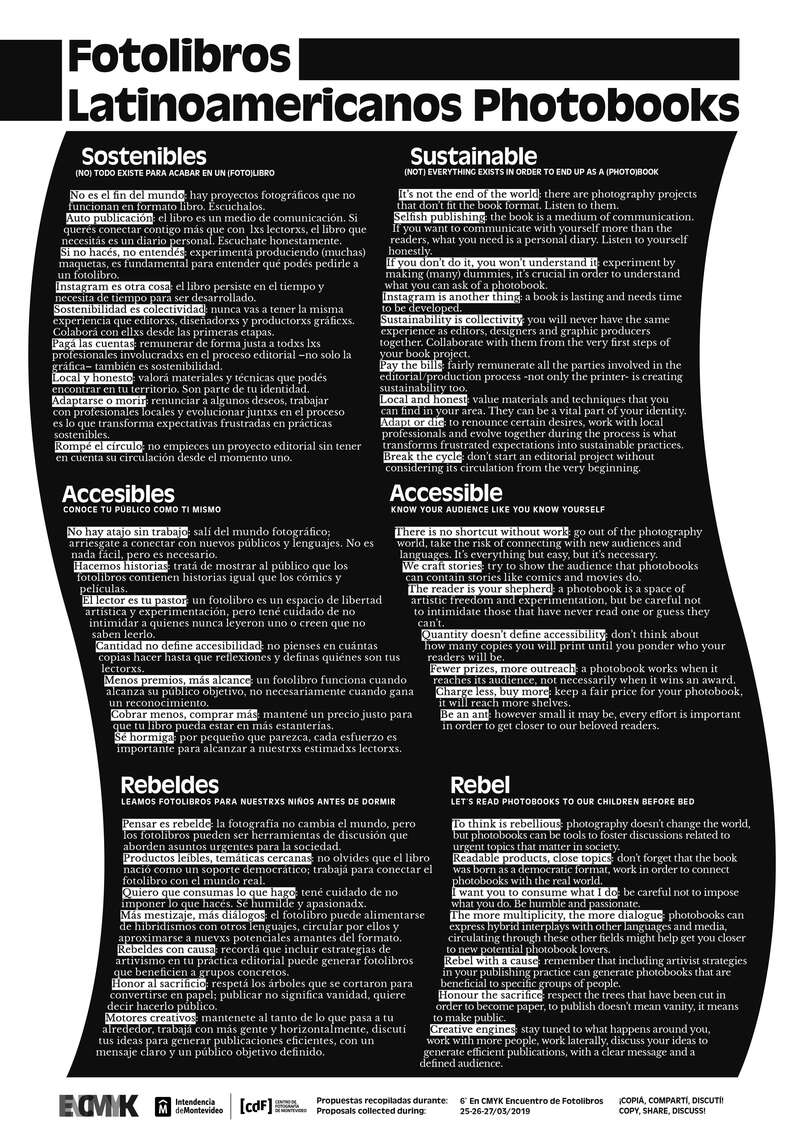
Manifesto for the future of Latin-American photobooks
Walter Costa constructed a manifesto about the future of Latin-American photobooks. It sums up the discussions that took place last March 2019 during the enCMYK Photobook Festival Costa curated for the Montevideo Center of Photography.
Note of the editors: This manifesto can be read along with his article 'Break the Cycle. Latin American photobooks and the audience', published by Trigger.
Walter Costa
08 nov. 2019 • 5 min
Sustainability or (Not)everything exists in order to end up as a (photo)book
-It’s not the end of the world: there are photography projects that don’t fit the book format. Listen to them.
-Selfish publishing: the book is a medium of communication. If you want to communicate with yourself more than the readers, what you need is a personal diary. Listen to yourself, honestly.
-If you don’t do, you don’t understand: experiment by making (many) dummies, it’s crucial in order to understand what you can ask a photobook.
-Instagram is another thing: a book persists in time and needs time to be developed.
-Sustainability is collectivity: you will never have the same experience as editors, designers and graphic producers together.
Accessibility or know your audience like you know yourself -There is no shortcut without work: go out the photography world, take the risk of connecting with new audiences and languages. It’s all but easy, but it’s necessary.
-We craft stories: try to show the audience that photobooks contain stories like comics and movies do.
-The reader is your shepherd: a photobook is a space of artistic freedom and experimentation, but be careful not to intimidate those that have never read one or guess they can’t.
-Quantity doesn’t define accessibility: don’t think about how many copies you will print until you ponder who will be your readers.
-Less prizes, more reach: a photobook works when it reaches up its audience, not necessarily when it wins an award.
-Charge less, buy more: keep a fair price for your photobook, it will reach more shelves.
-Be an ant: however small it may be, every effort is important in order to get closer to our beloved readers.
Collaborate with them since the very first steps of your book project.
-Pay the bills: to fairly remunerate all the professionals involved in the editorial process -not only the printer- it’s sustainability too.
-Local and honest: value materials and techniques that you can find in your area. They are part of your identity.
-Adapt or die: to renounce some desires, work with local professionals and evolve together during the process is what transforms frustrated expectations into sustainable practices.
-Break the circle: don’t start an editorial project without considering its circulation from the very beginning.
Rebelliousness or let’s read photobooks to our children before bed
-To think is rebellious: photography doesn’t change the world, but photobooks can be tools to foster discussions related to urgent topics that matter society.
-Readable products, close topics: don’t forget that the book was born as a democratic format, work in order to connect photobooks with the real world.
-I want you to consume what I do: be careful not to impose what you do. Be humble and passionate.
-More miscegenation, more dialogue: photobooks can be fed by hybridism with other languages and media, circulating through them and getting closer to new potential photobook lovers.
-Rebel with a cause: remember that including artivism strategies in your publishing practice can generate photobooks that are beneficial to specific groups of people.
-Honour the sacrifice: respect the trees that have been cut in order to become paper, to publish doesn’t mean vanity, it means to make public.
-Creative engines: stay tuned to what happens around you, work with more people, work horizontally, discuss your ideas to generate efficient publications, with a clear message and a defined audience.